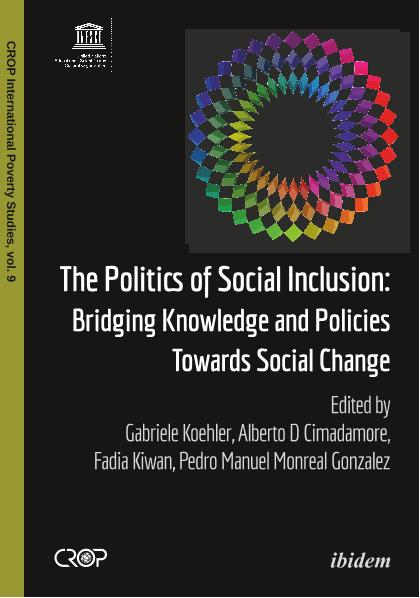Mostrar el registro sencillo del ítem
dc.contributor.author
Koehler, Gabriele
dc.contributor.author
Cimadamore, Alberto Daniel

dc.contributor.author
Kiwan, Fadia
dc.contributor.author
Monreal Gonzalez, Pedro
dc.contributor.other
Koehler, Gabriele
dc.contributor.other
Cimadamore, Alberto Daniel

dc.contributor.other
Kiwan, Fadia
dc.contributor.other
Monreal Gonzalez, Pedro Manuel
dc.date.available
2022-05-20T20:01:00Z
dc.date.issued
2020
dc.identifier.citation
Koehler, Gabriele; Cimadamore, Alberto Daniel; Kiwan, Fadia; Monreal Gonzalez, Pedro; The politics of social inclusion: Introduction; Ibidem Press; Comparative Research Programme on Poverty; United Nations Educational, Scientific and Cultural Organization; 9; 2020; 13-40
dc.identifier.isbn
978-3-8382-1333-0
dc.identifier.uri
http://hdl.handle.net/11336/157983
dc.description.abstract
Academics, policy-makers, civil society and concerned citizens across the planet are alarmed by the persistence of global poverty, the intensity of social exclusion and increasing inequalities. Multidimensional poverty continues to affect half of humanity. Inequality has reached unprecedented levels: according to Oxfam’s analysis, for example, in 2018, 26 people owned the same wealth as the 3.8 billion people who make up the poorest half of humanity (Oxfam, 2019; also see Piketty, 2014; UNRISD, 2018). Climate change impact and armed conflicts are wiping out many human development achievements of the past decades, frequently exacerbating existing patterns of social exclusion. To redress the dystopian situation, the international community adopted the 2030 Agenda for Sustainable Development – Transforming our World (United Nations, 2015), the Paris Agreement on Climate Change (UNFCCC, 2015), and designed a new urban agenda (UN Habitat, 2016). All of these have in common a commitment to norms and principles of social inclusion – promising to ‘end poverty and hunger in all their forms and dimensions’ and to ‘leave no one behind’. Leaving no one behind has been understood in a universalist and rights-based interpretation as including all people on the planet in sustainable and just societies. That would indeed be transformative of the dominant socio-economic orders, which have been reproducing and cementing poverty, inequality and social exclusion throughout history. The status quo to be transformed is maintained by power relations which need to be addressed in order to produce sustainable economic, social, ecological and political inclusion for all. However, the structural transformations that would be required to unseat the dynamics of poverty, inequalities and exclusion are far less addressed, and do not feature expressly in the normative texts. Besides, the concept of inclusion is not defined, and therefore it is not possible to measure or evaluate progress toward the achievement of this goal, which is central to the general ambition to ‘leave no one behind’. In short, power relations tend to be ignored or overlooked in domestic and multilateral policy debates (UNRISD, 2016), and the absence of a clear understanding of what social inclusion means articulates the problematic on which this book intends to focus. This volume was therefore conceived to address the power relations that both sustain and transform social orders marked by social exclusion, and to advance the understanding of the politics of social inclusion.
dc.format
application/pdf
dc.language.iso
eng
dc.publisher
Ibidem Press; Comparative Research Programme on Poverty; United Nations Educational, Scientific and Cultural Organization
dc.rights
info:eu-repo/semantics/openAccess
dc.rights.uri
https://creativecommons.org/licenses/by-sa/2.5/ar/
dc.subject
Social inclusion
dc.subject
Social exclusion
dc.subject
Power dynamics
dc.subject
Sustainable development
dc.subject.classification
Ciencias Sociales Interdisciplinarias

dc.subject.classification
Otras Ciencias Sociales

dc.subject.classification
CIENCIAS SOCIALES

dc.title
The politics of social inclusion: Introduction
dc.type
info:eu-repo/semantics/publishedVersion
dc.type
info:eu-repo/semantics/bookPart
dc.type
info:ar-repo/semantics/parte de libro
dc.date.updated
2021-09-29T17:02:57Z
dc.journal.volume
9
dc.journal.pagination
13-40
dc.journal.pais
Alemania

dc.journal.ciudad
Stuttgart
dc.description.fil
Fil: Koehler, Gabriele. United Nations Research Institute for Social Development; Suiza
dc.description.fil
Fil: Cimadamore, Alberto Daniel. Consejo Nacional de Investigaciones Científicas y Técnicas; Argentina. Universidad de Buenos Aires; Argentina
dc.description.fil
Fil: Kiwan, Fadia. Unesco; Argentina
dc.description.fil
Fil: Monreal Gonzalez, Pedro. Unesco; Argentina
dc.relation.alternativeid
info:eu-repo/semantics/altIdentifier/url/http://cup.columbia.edu/book/the-politics-of-social-inclusion/9783838213330
dc.conicet.paginas
355
dc.source.titulo
The politics of social inclusion: Bridging knowledge and policies towards social change
Archivos asociados
